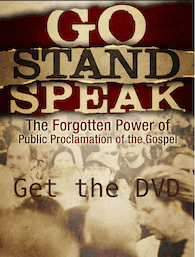T.M. Moore
“Yet the Most High does not dwell in houses made by hands, as the prophet says, ‘Heaven is my throne, and the earth is my footstool…” --Acts 7:48, 49
One of those angry young men present at the trial and murder of Stephen was a young zealot from Tarsus, an up-and-comer in Jewish religious and intellectual ranks. His name was Saul. When we first meet him, holding the coats of Stephen’s murderers, he seems to be still an apprentice – not ready to get his hands dirty, but available to assist those who were. He was of the same mind as those who tore at Stephen. He was just as hostile to the Gospel as they (Acts 8:1), and he was eager to prove his commitment to root out the Christian menace.
We recall that Stephen was charged with sinning against the temple of the Lord, by explaining that God, through the resurrection of Jesus Christ and the outpouring of His Spirit, was now building a new temple, the Church. Stephen’s defense against his prosecutors focused on that charge; he was determined to demonstrate that the charge was baseless and, even more, that his accusers were completely mistaken concerning God’s intentions with respect to His dwelling among men.
Having laid a foundation for his main point, by agreeing with the idea that God is determined to dwell among men, Stephen pointed first to the tabernacle in the wilderness (Acts 7:44-46). Undoubtedly those generations served by the tabernacle were of the mindset that this was God’s permanent dwelling-place among His people.
But, Stephen continued, we know that was not the case. For Solomon built a house for God (v. 47), which had subsequently been destroyed and replaced by the present house, against which Stephen was accused of making threats. But, Stephen continued, God Himself had made it known through the prophet Isaiah that this earthly temple was not to be His true or final dwelling. “What kind of house will you build for me, says the Lord, or what is the place of my rest?
Did not my hands make all these things?” (vv. 49, 50; cf. Is. 66:1, 2). Stephen’s point was a subtle one: Had his accusers failed to understand their own prophet? Had they failed to look beyond the temple to a greater and more permanent dwelling-place for God? Had they, in fact, made an idol of the temple, just, as he explained earlier, the people had made an idol in the wilderness (vv.38-42)?
And just so they didn’t miss the point, Stephen put the cards face-up on the table: “You stiff-necked people, uncircumcised in heart and ears, you always resist the Holy Spirit. As your fathers did, so do you” (v. 51). It’s as if Stephen had said, “You self-deceived, power-hungry fools, who think you can control us all by making the temple and traditions of God your own special order of operations! You read your traditions selectively, or not at all, so it’s no wonder you’re so blind to the truth about God.”
You don’t get much more in-your-face than that. But the Jews had heard enough, and their fury could not be contained. Nothing would keep them from silencing such impertinence. Except one thing: It is very interesting to note, in Paul’s sermon on Mars Hill, that he takes off on the Greek philosophers from the same place Stephen had taken off on him and his cronies, so many years earlier (Acts 17:24). Had Stephen’s bold and daring witness made a lasting impression?
Was his suffering and death worth it? Paul never got over the shame and sorrow he felt over his role in Stephen’s murder, as we see in Acts 22:20. Stephen’s confrontational manner before those who presumed to try him may have infuriated them all, including Saul, to the point of murder. But the long-term value of his sacrifice cannot be measured, given the role the Apostle Paul fulfilled in the wide-spread establishment of the Christian faith throughout the world of his day.
Is God preparing you for such a role? You can’t know, but you must be ready. A hostile age, after all, can only destroy our bodies. But who knows what power may be unleashed by our in-your-face witness before a hostile age?
Download the series, "Standing for Christ in a Hostile Age." Click here: VP Hostile Age.





